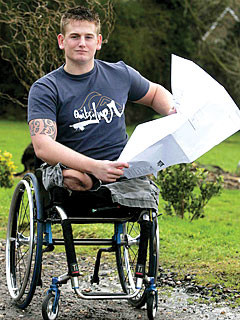By Amelia Gentleman
The Ministry of Defence has nearly tripled the number of rehabilitation beds available for severely wounded soldiers from Afghanistan to accommodate a sharp rise in the number of soldiers who have lost one or more limbs in the conflict.

Joe Townsend
The military's Headley Court rehabilitation centre, near Epsom, Surrey, recently opened a second new 30-bed extension, expanding its total capacity to 96, up from 36 beds in 2007.
Staff numbers have also risen in line with the increase in severely injured soldiers who require long-term, specialist support, and the in-house prosthetics team has doubled in size over the past year in response to the surge in demand for new limbs.
More service personnel lost limbs in explosions in Afghanistan in the first nine months of this year than the total figure for 2009, according to MoD data released earlier this week. A total of 58 had undergone amputations as a result of injuries sustained in Afghanistan by the end of September, compared with 55 for 2009, according to Defence Analytical Services and Advice statistics. Military doctors are treating rising numbers of double and triple amputees.
The rise in critically injured casualties is partly the result of improved frontline medical care and enhanced evacuation arrangements, which has meant that there are many more "unexpected survivors" after explosions in Afghanistan. Until 2008, when staff at Headley Court began working with their first triple amputee, no one who had lost three limbs during fighting had lived.
Staff estimate that there are now about 15 personnel who have had triple amputations. The rehabilitation process for soldiers who have lost several limbs takes much longer, and treatment at Headley Court can stretch over several years, with patients spending a month in the centre, followed by a month at home.
Blesma (the British Limbless Ex Service Men's Association) estimates that at least 48 people have lost two limbs in Afghanistan. "We have a painful number of these," Headley Court's commanding officer, Colonel Jerry Tuck, of the Royal Army Medical Corps, said. "If you put more people out in the field, you get more casualties."
Staff at the centre are refining their methods for caring for soldiers with far more severe injuries than they have previously worked with, Tuck said. "The admission numbers are going up because the patients are more complex and they are coming back more frequently, that's a definite."
A surge in Afghanistan earlier this year put unprecedented pressure on medical services both at the intensive care unit at Selly Oak hospital in Birmingham, and at Headley Court. New facilities have been opened in both centres in recent months. "We just opened a new ward over the road. It is not in the ideal place but it's in the place where we could build fastest," Tuck said.
Joe Townsend, 22, a marine whose legs were blown off when he stepped on an improvised explosive device while on patrol in Helmand province in 2008, is still receiving treatment at Headley Court.
"When I got here first there was nowhere near as many in the same situation as now. It's crap but that is how it is. There is a lot more use of IEDs now than before and the lads are treading on them more often," he said.
Jerome Church, general secretary of Blesma, said: "It's possible that the enemy's bomb technology has improved, but medical intervention and trauma management is improving in leaps and bounds.
"People are surviving now who perhaps even as little as a year ago wouldn't have survived."



